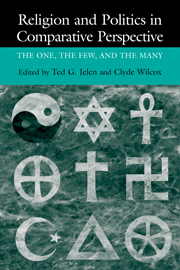Book contents
- Frontmatter
- Contents
- List of Contributors
- Preface
- 1 Religion: The One, the Few, and the Many
- 2 The Challenge of Pluralism
- 3 Catholicism, Politics, and Culture in the Republic of Ireland
- 4 Religion and Politics in Iberia
- 5 The Religious Dimension of Israeli Political Life
- 6 Between Heaven and Earth
- 7 Islamism in Contemporary Arab Politics
- 8 Religion and Politics in a Secular Europe
- 9 Religion and Democracy in South America
- 10 Looking for Hope in Central America
- 11 Religion and Politics in India
- 12 Religion and Politics in Japan
- 13 Religion and Politics in an Open Market
- 14 The Political Roles of Religion
- Index
9 - Religion and Democracy in South America
Challenges and Opportunities
Published online by Cambridge University Press: 05 June 2012
- Frontmatter
- Contents
- List of Contributors
- Preface
- 1 Religion: The One, the Few, and the Many
- 2 The Challenge of Pluralism
- 3 Catholicism, Politics, and Culture in the Republic of Ireland
- 4 Religion and Politics in Iberia
- 5 The Religious Dimension of Israeli Political Life
- 6 Between Heaven and Earth
- 7 Islamism in Contemporary Arab Politics
- 8 Religion and Politics in a Secular Europe
- 9 Religion and Democracy in South America
- 10 Looking for Hope in Central America
- 11 Religion and Politics in India
- 12 Religion and Politics in Japan
- 13 Religion and Politics in an Open Market
- 14 The Political Roles of Religion
- Index
Summary
INTRODUCTION
From the 1960s through the early 1980s, the Latin American Catholic Church earned a reputation as a dynamic, progressive institution that stood in courageous opposition to repressive military regimes and socioeconomic injustice. Although scholars have exaggerated the extensiveness of progressive Catholicism, Catholic clergy and lay agents played an important but not decisive role in restoring democratic rule to the South American continent. Catholic bishops in Brazil and Chile steadfastly criticized the practices and raison d'être of dictatorships while helping to mediate the reinstatement of civilian rule (Fleet and Smith 1997; Cavendish 1995; Mainwaring 1986). In other countries – even those with pro-authoritarian episcopacies such as Argentina – grassroots Catholic communities kept pressure on dictators by exposing human rights abuses, calling attention to the needs of the poor and sheltering political dissidents (cf. Keogh 1990). For their part, grassroots religious communities helped pave the way for greater levels of popular participation in government following the restoration of civilian rule.
The end to authoritarian rule during the 1980s dramatically changed the sociopolitical landscape. Catholic clergy and lay activists now face new challenges to the traditional role of religion in society, and enjoy increased opportunities for strengthening democratic civil society. The biggest challenge facing the Catholic Church in the new democratic era is the political, social and religious pluralism that has accompanied increased political liberalization. For most of its history, the Catholic Church has been the hegemonic cultural institution in the region.
- Type
- Chapter
- Information
- Religion and Politics in Comparative PerspectiveThe One, The Few, and The Many, pp. 193 - 222Publisher: Cambridge University PressPrint publication year: 2002
- 2
- Cited by



